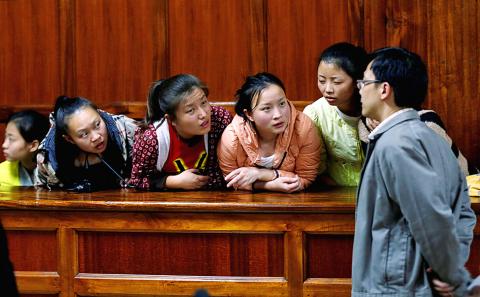Despite strong pressure from China, a Kenyan court yesterday acquitted five Taiwanese charges of for telecommunications fraud in Nairobi and demanded their deportation to Taiwan.
According to a Ministry of Foreign Affairs source, the court found five Taiwanese and 35 Chinese fraud suspects not guilty in a closely watched telecommunications fraud case.
“The court also demanded that the five Taiwanese be deported to Taiwan. If Chinese authorities forcibly send them to China, they will be no different from bandits,” the source said, adding that the exact time of the pending deportation of the five Taiwanese was still to be determined.

Photo: Reuters
Earlier yesterday, Ministry of Foreign Affairs spokeswoman Eleanor Wang (王珮玲), citing a “credible source” who spoke on condition of anonymity to the Taipei Liaison Office in South Africa, said the Kenyan court moved up a court session originally scheduled for Aug. 23 to 9am local time yesterday.
Wang said the liaison office immediately sent staff to Nairobi to hear the court verdict and keep an eye on the ensuing developments.
It was believed the five Taiwanese suspects would be deported to China along with their Chinese counterparts, Wang added.
The unexpected change to the convening date for the court session was reportedly prompted by mounting pressure from China, which had insisted on deporting the Taiwanese suspects to China for further investigation on the grounds that most of those targeted were Chinese.
The session had been postponed five times since the case was first heard in Nairobi in April.
The five Taiwanese are among a group of 77 fraud suspects — 48 Chinese, 28 Taiwanese and one Thai — detained by Kenyan police in November 2014 and charged with engaging in unlicensed telecommunications activities, using radio equipment without a license and organized crime.
Twenty-three of the Taiwanese were deported to Beijing following their acquittal by a court on April 5.
Meanwhile, the ministry yesterday confirmed that a total of 11 Taiwanese have been arrested in Indonesia for alleged involvement in telecom fraud, after a police raid at two residences in Jakarta.
Indonesian police arrested a total of 31 suspects, including 11 Taiwanese, during the raid on Thursday, the ministry said.
They have all been detained at an immigration facility pending further investigation, it added.
Taiwan’s representative office in Indonesia has been in close contact with local authorities to keep abreast of the situation, the ministry said.
The ministry said that it would make every effort to ensure the Taiwanese suspects are sent back to Taiwan if the Indonesian authorities decide to deport them after the investigation.
The suspects allegedly engaged in telecom fraud at the luxury residences, where they pretended to be police to scam people in Taiwan and China, Indonesian media reported, citing local police.
There were hundreds of victims, they added.
The police also discovered equipment allegedly used in the fraud, including landlines, cellphones and laptops, the reports said.
Additional reporting by CNA

INVESTIGATION: The case is the latest instance of a DPP figure being implicated in an espionage network accused of allegedly leaking information to Chinese intelligence Democratic Progressive Party (DPP) member Ho Jen-chieh (何仁傑) was detained and held incommunicado yesterday on suspicion of spying for China during his tenure as assistant to then-minister of foreign affairs Joseph Wu (吳釗燮). The Taipei District Prosecutors’ Office said Ho was implicated during its investigation into alleged spying activities by former Presidential Office consultant Wu Shang-yu (吳尚雨). Prosecutors said there is reason to believe Ho breached the National Security Act (國家安全法) by leaking classified Ministry of Foreign Affairs information to Chinese intelligence. Following interrogation, prosecutors petitioned the Taipei District Court to detain Ho, citing concerns over potential collusion or tampering of evidence. The

‘FORM OF PROTEST’: The German Institute Taipei said it was ‘shocked’ to see Nazi symbolism used in connection with political aims as it condemned the incident Sung Chien-liang (宋建樑), who led efforts to recall Democratic Progressive Party (DPP) Legislator Lee Kun-cheng (李坤城), was released on bail of NT$80,000 yesterday amid an outcry over a Nazi armband he wore to questioning the night before. Sung arrived at the New Taipei City District Prosecutors’ Office for questioning in a recall petition forgery case on Tuesday night wearing a red armband bearing a swastika, carrying a copy of Adolf Hitler’s Mein Kampf and giving a Nazi salute. Sung left the building at 1:15am without the armband and apparently covering the book with a coat. This is a serious international scandal and Chinese

Seventy percent of middle and elementary schools now conduct English classes entirely in English, the Ministry of Education said, as it encourages schools nationwide to adopt this practice Minister of Education (MOE) Cheng Ying-yao (鄭英耀) is scheduled to present a report on the government’s bilingual education policy to the Legislative Yuan’s Education and Culture Committee today. The report would outline strategies aimed at expanding access to education, reducing regional disparities and improving talent cultivation. Implementation of bilingual education policies has varied across local governments, occasionally drawing public criticism. For example, some schools have required teachers of non-English subjects to pass English proficiency

NEGOTIATIONS: The US response to the countermeasures and plans Taiwan presented has been positive, including boosting procurement and investment, the president said Taiwan is included in the first group for trade negotiations with the US, President William Lai (賴清德) said yesterday, as he seeks to shield Taiwanese exporters from a 32 percent tariff. In Washington, US Trade Representative Jamieson Greer said in an interview on Fox News on Thursday that he would speak to his Taiwanese and Israeli counterparts yesterday about tariffs after holding a long discussion with the Vietnamese earlier. US President Donald Trump on Wednesday postponed punishing levies on multiple trade partners, including Taiwan, for three months after trillions of US dollars were wiped off global markets. He has maintained a 10 percent